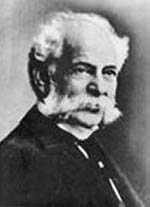Henry J. Heinz
| Henry J. Heinz | |
|---|---|
 | |
| Born |
Henry John Heinz October 11, 1844 Pittsburgh, Pennsylvania United States |
| Died |
May 14, 1919 (aged 74) Pittsburgh, Pennsylvania United States |
Cause of death | Pneumonia |
| Occupation | Business magnate |
| Title | Founder of Heinz Foods. |
| Spouse(s) | Sarah Sloan Young Heinz (m. 1869; wid. 1894) |
| Children |
|
Henry John Heinz (October 11, 1844 – May 14, 1919) was an American businessman of German descent who founded the H. J. Heinz Company. Heinz Field, which is the home of the Pittsburgh Steelers NFL team, is named in his honor.
H. J. Heinz Company
The company continued to grow, and in 1888 Heinz bought out his other two partners and reorganized the company as the H. J. Heinz Company, the name it carries to the present day. Its famous slogan, "57 varieties", was introduced by Heinz in 1896. The reason for "57" is unclear. Heinz said he chose "5" because it was his lucky number and the number "7" was his wife's lucky number.[1]
H. J. Heinz was incorporated in 1905, and Heinz served as its first president, remaining in the position for the rest of his life. Under his tutelage, the company was noted for fair treatment of workers and for pioneering safe and sanitary food preparation. He provided his employees with free medical care, recreation facilities such as gyms, swimming pools, and gardens; and educational opportunities such as libraries, free concerts, and lectures. Heinz led a successful lobbying effort in favor of the Pure Food and Drug Act in 1906. During World War I, he worked with the Food Administration.[2]
He was a director in many financial institutions, and was chairman of a committee to devise ways of protecting Pittsburgh from floods.[2]
At the time of Heinz's death in Pittsburgh at the age of 74, the H. J. Heinz Company had over twenty food processing plants, and also included seed farms and container factories. Heinz was the grandfather of H. J. Heinz II, great-grandfather of U.S. Senator H. John Heinz III of Pennsylvania in the United States and great-great grandfather of Henry John Heinz IV, Andre Thierstein Heinz and Christopher Drake Heinz.
Personal life
Heinz was a devout Methodist. At the beginning of his will he wrote: "I desire to set forth, at the very beginning of this Will, as the most important item in it, a confession of my faith in Jesus Christ as my Savior." When he visited England, his "tourist stops" included the grave of John Bunyan, Isaac Watts, and John Wesley. He visited a chapel that John Wesley founded, where he later wrote, "I felt I was upon holy ground."
Heinz was married to Sarah Sloan Young Heinz in 1869 and had four children:[3]
- Clarence Heinz
- Howard Covode Heinz (1877-1941)
- Clifford Heinz (1883-1935)
- Irene Heinz Givens
A bronze statue of Heinz by Emil Fuchs was dedicated on October 11, 1924 at the Heinz Company building Pittsburgh,[4]
See also
- German inventors and discoverers
Notes
- ↑ Rawsthorn, Alice (12 April 2009). "An Icon, Despite Itself". New York Times. Retrieved 2009-06-09.
- ↑ 2.0 2.1
 "Heinz, Henry John". Collier's New Encyclopedia. 1921.
"Heinz, Henry John". Collier's New Encyclopedia. 1921. - ↑ "Henry J. Heinz". Notable Names Database. Soylent Communications. Retrieved 27 January 2013.
- ↑ http://siris-artinventories.si.edu/ipac20/ipac.jsp?session=P38T9M2547577.232&profile=ariall&source=~!siartinventories&view=subscriptionsummary&uri=full=3100001~!26771~!14&ri=1&aspect=Keyword&menu=search&ipp=20&spp=20&staffonly=&term=fuchs&index=.AW&uindex=&aspect=Keyword&menu=search&ri=1
References
- Alberts, Robert C. (1973). The Good Provider: H. J. Heinz and His 57 Varieties. Boston: Houghton Lindsey Mifflin Company. ISBN 0-395-17126-1.
- Henry Heinz and Brand Creation in the Late Nineteenth Century: Making Markets for Processed Food by Nancy F. Koehn. The Business History Review, Vol. 73 (Autumn, 1999), pp. 349–393.
|
| ||||||||||||||||||||